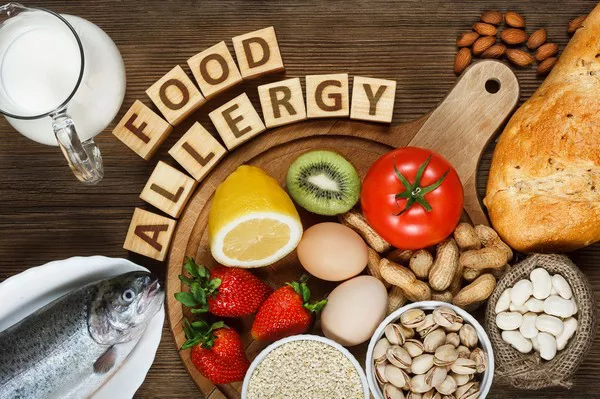Swollen lips can be both uncomfortable and alarming, often indicating an allergic reaction. Allergic reactions occur when the immune system overreacts to substances it perceives as harmful, triggering a cascade of symptoms, including swelling. Understanding the various allergens that can cause swollen lips is crucial for prompt identification and appropriate management. In this article, we will explore common allergens that can lead to lip swelling, symptoms, prevention, and treatment options.
Common Allergens Causing Swollen Lips
1. Food Allergens: Certain foods can trigger allergic reactions in susceptible individuals. Common food allergens associated with lip swelling include:
a. Shellfish: Shrimp, crab, lobster, and other shellfish can cause allergic reactions characterized by lip swelling, hives, itching, and difficulty breathing.
b. Nuts: Peanuts, tree nuts like almonds, walnuts, and cashews, are potent allergens that can lead to lip swelling and more severe reactions in some cases.
c. Milk and Dairy: Milk, cheese, and other dairy products contain proteins that may trigger allergic reactions, including swollen lips.
d. Eggs: Egg allergies are common in children and can lead to swelling, itching, and rashes around the lips.
e. Soy: Soy allergies can manifest with lip swelling, hives, and gastrointestinal symptoms.
f. Wheat: Allergic reactions to wheat may lead to lip swelling, hives, and digestive disturbances.
2. Insect Stings and Bites: Insect venom contains proteins that can trigger allergic reactions in sensitive individuals. Bee stings, wasp stings, and ant bites are common culprits of swollen lips in such cases.
3. Medications: Some medications can cause allergic reactions leading to swollen lips and other symptoms. Common offenders include antibiotics (penicillin, sulfa drugs), nonsteroidal anti-inflammatory drugs (NSAIDs), and certain anticonvulsants.
4. Cosmetics and Personal Care Products: Lip balms, lipsticks, and other cosmetics may contain allergens like fragrances, dyes, and preservatives that can cause allergic reactions, leading to swollen lips.
5. Latex: Latex allergy can be triggered by contact with latex gloves, balloons, or other latex-containing products, leading to lip swelling and other symptoms.
6. Airborne Allergens: Inhaling allergens like pollen, dust mites, pet dander, or mold spores can cause allergic reactions, and in some cases, swelling of the lips may occur.
Symptoms of Allergic Reaction and Swollen Lips
Allergic reactions affecting the lips can manifest in various ways, often accompanied by additional symptoms:
Lip Swelling: Swollen lips are a common symptom of allergic reactions. The swelling may be mild or severe and can occur rapidly after exposure to the allergen.
Itching and Redness: Allergic reactions may cause itching and redness of the lips, leading to discomfort and irritation.
Hives (Urticaria): Raised, red, and itchy welts on the skin, known as hives, may appear on or around the lips as part of the allergic reaction.
Tingling Sensation: Some individuals may experience a tingling or burning sensation on the lips before swelling occurs.
Difficulty Breathing: Severe allergic reactions, known as anaphylaxis, can cause swelling of the throat and airways, leading to difficulty breathing, chest tightness, and wheezing. This is a medical emergency and requires immediate attention.
Nausea and Vomiting: Ingesting allergens, especially food allergens, can lead to gastrointestinal symptoms like nausea and vomiting.
Prevention and Management
Preventing allergic reactions and subsequent lip swelling involves identifying and avoiding specific allergens. Here are some strategies to consider:
Allergen Identification: If you have experienced lip swelling or any other allergic symptoms, consult an allergist for comprehensive allergy testing to identify specific triggers.
Food Allergies: If you have a known food allergy, read food labels carefully, inform restaurant staff about your allergies, and be cautious about cross-contamination in the kitchen.
Insect Allergies: If you have a history of severe reactions to insect stings or bites, carry an epinephrine auto-injector (EpiPen) as prescribed by your doctor. Learn how to use it in case of an emergency.
Medications: Inform your healthcare provider about any known medication allergies. If prescribed a new medication, ask about potential side effects and allergic reactions.
Cosmetics and Personal Care Products: Patch test new cosmetics on a small area of skin before applying them to your lips or face. Choose products labeled as hypoallergenic and fragrance-free.
Latex Allergies: Avoid contact with latex-containing products. Opt for latex-free alternatives such as vinyl or nitrile gloves.
Treatment Options
The management of swollen lips due to allergic reactions depends on the severity of the reaction. Mild cases may resolve on their own, while severe reactions require immediate medical attention. Here are some general treatment options:
Antihistamines: Over-the-counter antihistamines can help relieve mild allergic symptoms, such as itching, redness, and mild swelling.
Topical Corticosteroids: For localized allergic reactions on the lips, a doctor may prescribe a mild corticosteroid cream to reduce inflammation and swelling.
Epinephrine: In severe allergic reactions or anaphylaxis, epinephrine (adrenaline) is the first-line treatment. Administering epinephrine via an auto-injector can help reverse life-threatening symptoms and buy time for emergency medical care.
Medical Attention: Seek immediate medical attention for severe reactions, difficulty breathing, or any symptoms of anaphylaxis. Emergency medical treatment may include intramuscular epinephrine and other medications.
Conclusion
Swollen lips caused by allergic reactions can be an uncomfortable and concerning experience. Identifying the specific allergen is essential for prevention and management. Food allergens, insect stings, medications, cosmetics, latex, and airborne allergens are common culprits behind lip swelling. Being vigilant about allergen exposure, taking preventive measures, and knowing how to respond to allergic reactions can help ensure prompt and appropriate management. If you experience severe or recurring allergic reactions, consult an allergist for a comprehensive evaluation and personalized care plan to safeguard your well-being and prevent future lip swelling episodes.


